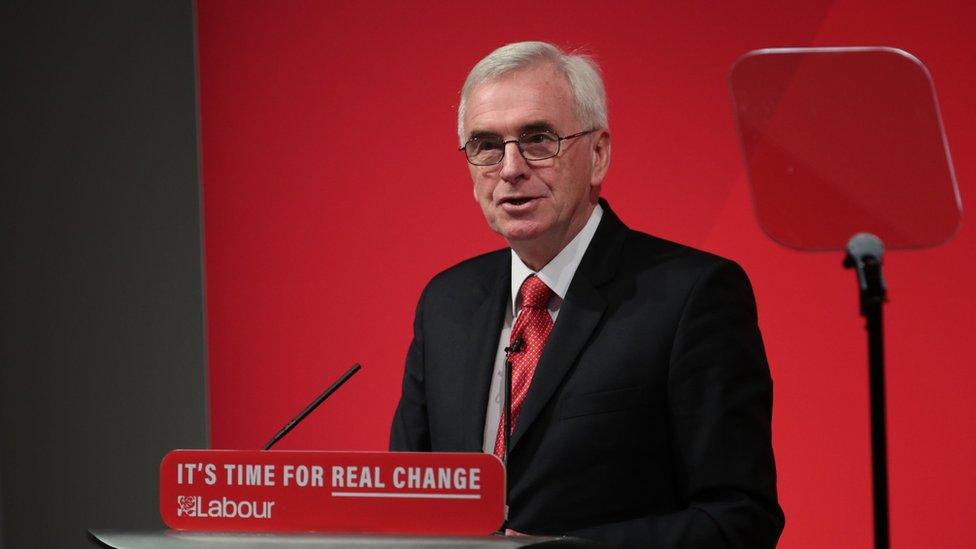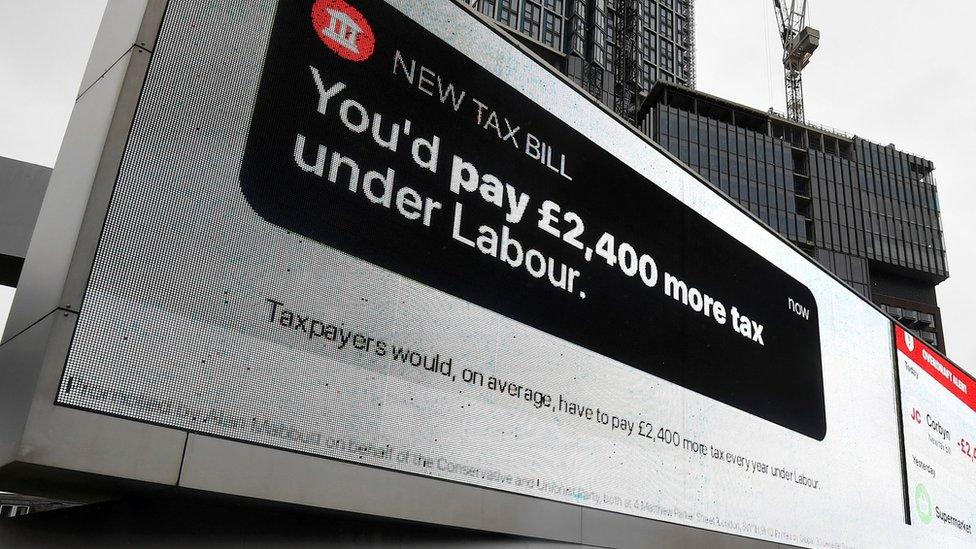General Election 2019: Tory £1.2 trillion Labour spending claim fact-checked
- Published

The claim: The Conservatives claim Labour would spend an additional £1.2tn over the next five years.
Reality Check verdict: Without having seen the Labour Party manifesto, it is impossible to reach an accurate tally.
The Conservative Party released a dossier, external, which claimed that a Labour government would mean extra spending of £1.2tn. The Conservatives arrived at this figure by adding up spending pledges from Labour's manifesto in 2017, commitments made by the shadow cabinet since then and policies passed by the Labour Party conference.
But the Labour Party has not yet published its manifesto, so the Conservative Party does not yet know what spending commitments it will contain.
Just because certain policy positions were passed at the Labour conference or appeared in Labour's 2017 manifesto, there is no guarantee they will be adopted for 2019.
And indeed, more spending pledges have been added, such as the plan to nationalise part of BT, to give free broadband to everyone.
That makes the job of accurately costing election pledges, at this stage of the campaign, impossible.
It would be the same as assuming that the Conservative Party manifesto will include all of the pledges Boris Johnson made in the Conservative Party leadership election, such as raising the threshold at which the higher rate of income tax is due from £50,000 to £80,000, which he costed at £10bn a year.
Nationalisation plans
There is also an issue with some of the costings in the dossier. For example, the Conservatives cost Labour's nationalisation plans at £196bn. This is based on an estimate - by the Confederation of British Industry - which was itself the subject of criticism.
You can read more about that figure in this Reality Check piece, but there are clear problems with it, such as the assumption that a Labour government would pay 30% more than assets were worth when buying them.
Labour says the 30% premium is "arbitrary, fanciful and reflects the kind of profiteering that public ownership will end" and that prices would be determined by Parliament.

Other questionable figures in the dossier include:
A £4.5bn cost for piloting a universal basic income. Shadow Chancellor John McDonnell has said Labour would pilot the scheme in Liverpool, Sheffield and "somewhere in the Midlands". Other countries have held universal basic income trials including Finland (involving 2,000 people) and Kenya (with 16,000 participants). The dossier's figure is based on giving £50 a week for a year to all of the 1.7 million adults in Liverpool, Sheffield and Birmingham.
£85bn to fund a 32-hour working week, which assumes the cut in average hours would happen straight away, rather than over a decade, which is the stated Labour policy
£35bn to abolish private schools. While a motion to that effect was passed at the Labour Party conference, there is no guarantee it will be adopted in the manifesto.
There is no question that Labour wants to spend a lot more than the Conservatives would.
There would, for example, be a £150bn social transformation fund to pay for upgrades to schools, hospitals, social care facilities and council homes over five years, as well as a £250bn green transformation fund to spend on things like sustainable energy and transport over 10 years.
But it is impossible to put an exact price tag on what they intend to do in government, at this stage. Mr McDonnell has called the Conservatives' dossier a "ludicrous piece of Tory fake news".

How much extra tax?
The Conservatives then used the £1.2tn figure to come up with an estimate that the extra spending would cost the average taxpayer an extra £2,400 a year.
To get to the £2,400 figure, the Conservatives have priced Labour's extra day-to-day spending (as opposed to investment spending) at an extra £651bn over five years.
From there, they say that Labour has announced policies to raise £277bn in extra taxes over five years, leaving them with a shortfall of £374bn.
So, if you then divide the shortfall by 31.2m UK taxpayers, you arrive at £2,400 a year each to plug the gap.
But this is calculated despite not knowing about Labour's tax-raising plans - most of their workings are based on the party's 2017 manifesto.
But there are additions, for example, the Conservatives claim Labour is considering a homes tax, which would cost households up to £375 more than the current Council Tax system, raising an extra £10.2bn.
However, this seems to be based on a policy-proposal document put forward by Guardian columnist George Monbiot in June and commissioned for the Labour Party.
The summary of the paper, external even states: "The following are proposals to the Labour Party, which will consider these as part of its policy development process in advance of the next general election."
Labour has said its tax plans "will affect 5% of the population - the rest of the population will benefit from it".


